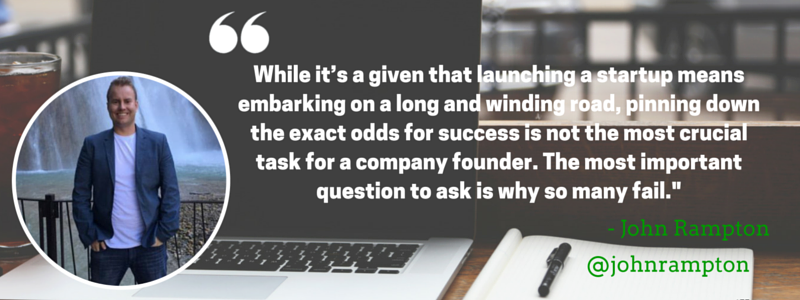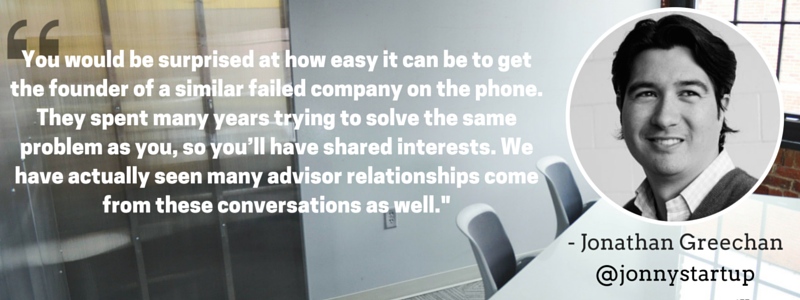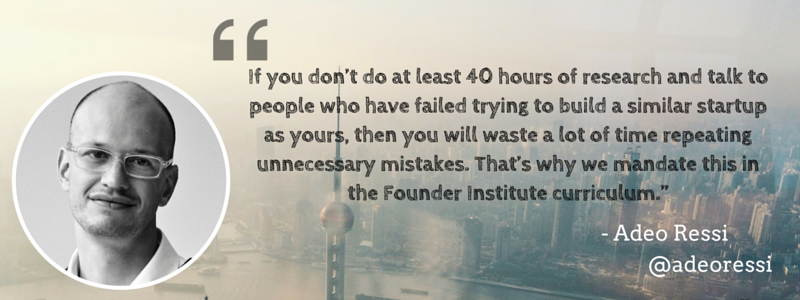
"It's fine to celebrate success but it is more important to heed the lessons of failure." - Bill Gates
Failure is a large part of starting a business. In fact, about 90% of all startups fail. And in the world of entrepreneurship, failure is not only expected, it’s embraced. From “Fail Fast, Fail Often” to “Fail Better” to “Fail Forward”, mantras about failure and its “benefits” abound in Silicon Valley.
However, as innovative tech luminaries extol the virtues of failure as a means to success, more and more aspiring founders take these words as gospel, celebrating startup snafus as instances of silicon-fueled bravado while neglecting to take the time to learn from mistakes and miscalculations that could have been easily avoided with a modicum of foresight.
And that is why we’ve compiled an in-depth guide that explores the ways in which entrepreneurs can learn from failure, specifically other startups that failed. While following the methods presented here won’t completely preclude you from making the occasional blunder when launching and running your company, it will make you think twice about taking the unnecessary risks that may leave your startup in the scrap heap.
Why You Should Learn from Failing Instead of Just Failing
Starting a tech company comes with its share of risks, and therefore, the chances of failure are considerably high. While the ability to get back on the horse after a defeat is a commendable trait, it seems that too many founders get caught up in the idea that not only may you fail when trying to build a startup, but that you SHOULD fail. Founders should be bold and take risks and experiment, but doing so without preparation and foresight will not get you anywhere.
In the Forbes article “Why Silicon Valley's 'Fail Fast' Mantra Is Just Hype”, Rob Asghar illuminates on the reality of many entrepreneurs, stating that many of them actually fear failure and warns of the dangers of carelessly embracing a mentality that is synonymous with overnight success:

How to Find Failed Startups in Your Industry
Because failure is so prevalent in the world of startups, more and more entrepreneurs are willing to open up about why their companies didn’t work, which means that there is an abundance of resources for fledgling founders. Below is a list of just a few of the resources, each with a wealth of valuable information:
- 135 Startup Failure Post-Mortems - This CB Insights article is a compilation of startup post-mortems that describe the factors that drove a startup’s demise told from the founder’s perspectives, but some also from the investor's’ point of view.
- 14 Startup Postmortems - Ryan Hoover, founder of Product Hunt, compiled this list of startup postmortems that he believes provides considerable value to budding founders.
- 33 Startups That Died Reveal Why They Failed - This Business Insider article gathers blog posts on a variety of failed startups from numerous industries.
- 5 SUCCESSFUL STARTUPS THAT FAILED & WHAT YOU CAN LEARN FROM THEM - Featuring key insights from founders that actually made it before having to close up shop, this Foundr article consists of lessons learned from Nayeem Hussain of Keen Home, Pippin Williamson of Pippin’s Plugins, and more.
- 77 Failed Startup Post-Mortems - This eBook from mozyrko.pl gathers a multitude of essays from the founders and investors of failed startups from throughout the web.
- Autopsy - Lessons from Failed Startups - Launched this year, Autopsy is a site that collects stories of startup failure to share the lessons learned with the startup community.
- Startup Postmortems - Another curated list of startups that failed, consisting of entrepreneurial fables from Everest, Wattage, Dinnr, Exec, and many more.
- Startup Post-Mortems Offer All Sorts Of Surprising Lessons - This Fast Company article plucks the best tips and bits of wisdom from 51 accounts of startup failures in multiple industries from 2007.
- These 12 startups died in Q2. Here’s why and how - Featured on VentureBeat, this article takes a look at 12 startups that ceased operations in one quarter earlier this year.
And if none of these sites give you what you need, you can always conduct simple searches on Google, Quora, HackerNews, FounderDating, TheFunded, Crunchbase, AngelList, and Linkedin, to find companies in your space or stories on failure.
However you find related companies that failed in your industry, be sure to always keep an updated list of contacts of founders, employees, and investors of startups that didn’t succeed.
Reaching Out to Failed Companies and What to Learn from Them

Now that you have a list of companies that failed in your industry, it is time to contact the people associated with those companies, including founders, employees, and investors.
However, when you reach out to your list of contacts, there are several key points you should address that will prove valuable when you launch your own startup. For example, in the Entrepreneur article, “10 Lessons to Learn From Failing Startups (Including My Own)”, John Rampton outlines several important lessons from failed startups, including his own. Keep each of these in mind as you go about contacting founders to help you get the most relevant startup wisdom.
- Validating the product idea with customers - Do people want what you have to offer?
- Understanding the importance of co-founders, partners, and team members - Have you surrounded yourself with people you share your mission and values?
- How and when to be aggressive - Do you have what it takes to pick up the phone and dial customers?
- Recognizing that fundraising is time-consuming - Do you have a more reliable means of funding, even if it's limited?
- Keeping your eyes on the financials - How will you make money?
- Sustaining a long-term vision - Have you clearly established the milestones you want your company to achieve?
- Raising too much - Is your product refined enough to invest considerable money into?
- Building a unique product - Does your product focus on too small of an audience?
- Remembering to continue building the business - Even if you're company is alreadly successful, how do plan to acquire more users and increase awareness?
- Finding the right investors - Do your investors share your company's mission and values?
Another topic that is worthy of discussion is revenue models:
- Revenue models that do and don’t work for your type of business
- The challenges of each revenue model
- The key metrics for each model
- Customer acquisition costs

How to Make the Most of Your Research
Now that you’ve collected considerable data on how other companies failed, it’s time to apply your findings to your own startup. According to serial-entrepreneur-turned-VC David Skok in his blog post, “Why Startups Fail”, these are some of the primary reasons why startups, well, fail:
Problem: Wrong Market
- There is not a compelling enough value proposition, or compelling event, to cause the buyer to actually commit topurchasing.
Problem: Business Model Failure
- One of the most common causes of failure in the startup world is that entrepreneurs are too optimistic about how easy it will be to acquire customers.
Problem: Poor Management Team
- Weak management is poor at execution, which leads to issues with the product not getting built correctly or on time, and the go-to market execution will be poorly implemented.
Problem: Running out of Cash
- A key job of the CEO is to understand how much cash is left and whether that will carry the company to a milestone that can lead to a successful financing, or to cash flow positive.
Problem: Product Problems
- In the best cases, it will take a few revisions to get the product/market fit right. In the worst cases, the product will be way off base, and a complete re-think is required.
Peruse through each of these risks and apply what you have learned from your research to ensure that you have a plan for every situation. To help get you started, take a look at what Tallat Mahmood, Managing Director of SkyPanther Capital, has to say on the above points in his blog post, “Learn Why Startups Fail And How You Can Be Of The 10% That Succeed”.
Solution: Know Your Market
- Paul Graham, co-founder of Y Combinator, implores founders to make something that people actually want. As you set out to build a desirable product, follow Graham’s advice and ask yourself this question: “What are people forced to do now because what you plan to do doesn’t exist yet?”
Solution: Perfect Your Business Model
- Your business model should clearly explain which consumer problem your startup solves and how your solution will works better than your competitors. If you need help creating your business model, here is the free Business Model Canvas tool created by Alex Osterwalder, speaker, author, and co-founder of Strategyzer.
Solution: Pick Your A-Team
- Your founding team requires a combination of complementary and balanced skills that are relevant to your company’s goals and mission. Also, employing a team with ideal skill sets will instill more confidence in potential investors, so take the time to choose your partners wisely.
Solution: Manage Your Finances
- Raising funds is an impressive milestone for any startup, but it should not be your primary goal when you are first starting out. Carefully think about when it’s time for you to start seeking funds, as there are numerous risks associated with raising money at the wrong time.
Solution: Build It and They Will Come
- Conduct a pre-mortem on on your product by pretending that your product has failed. This can help you catch problems with your product before you launch, and will prevent you from having to perform a post-mortem later.

Final Thoughts
Be bold. Be daring. But be careful. Entrepreneurship isn't about taking a series of endless risks in the vain hope that one of your uncertain decisions will lead to success. If you are about to launch your first company, hopefully this blog post has prepared you to build a startup without making easily avoidable mistakes. And if you're a seasoned entrepreneur with several failed startups to your credit, then hopefully this blog post has given you the confidence you need to pick yourself back up and try, try again.
"For every failure, there's an alternative course of action. You just have to find it. When you come to a roadblock, take a detour." - Mary Kay Ash



